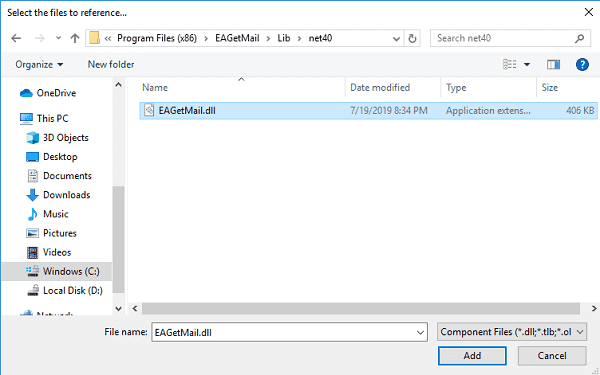VB.NET - Parse email¶
After you received the emails from email server to the local folder, we can use the following code to parse the email now. The following vb.net code demonstrates how to parse from, to, cc, subject, body text, attachments of specified EML file.
Installation¶
Before you can use the following sample codes, you should download the EAGetMail Installer and install it on your machine at first. Full sample projects are included in this installer.
Install from NuGet
You can also install the run-time assembly by NuGet. Run the following command in the NuGet Package Manager Console:
Install-Package EAGetMail
Note
If you install it by NuGet, no sample projects are installed, only .NET assembly is installed. And you also need to get a trial license code from here instead of using “TryIt”.
Add reference¶
To use EAGetMail POP3 & IMAP Component in your project, the first step is “Add reference
of EAGetMail to your project”. Please create or open your project with Visual Studio,
then go to menu -> Project -> Add Reference -> .NET -> Browse..., and
select Installation path\Lib\[netversion]\EAGetMail.dll, click Open-> OK, the reference
will be added to the project, you can start to use it to
retrieve email and parse email in your project.

.NET assembly¶
Because EAGetMail has separate builds for .Net Framework, please refer to the following table and choose the correct dll.
Separate builds of run-time assembly for .Net Framework 2.0, 4.0, 4.5, 4.6.1, 4.7.2, 4.8.1, .NET 6.0, NET 7.0, .NET 8.0, .NET Standard 2.0 and .Net Compact Framework 2.0, 3.5.
| File | .NET Framework Version |
| Lib\[net20|40|45|461|472|481]\EAGetMail.dll |
Built with .NET Framework 2.0, 4.0, 4.5, 4.6.1, 4.7.2, 4.8.1
It requires .NET Framework 2.0, 3.5 or later version. |
| Lib\[net6.0|7.0|8.0]\EAGetMail.dll |
Built with .NET 6.0, .NET 7.0, .NET 8.0
It requires .NET 6.0 or later version. |
| Lib\netstandard2.0\EAGetMail.dll |
Built with .NET Standard 2.0
It requires .NET Standard 2.0 or later version. |
| Lib\[net20-cf|net35-cf]\EAGetMail.dll |
Built with .NET Compact Framework 2.0, 3.5
It requires .NET Compact Framework 2.0, 3.5 or later version. |
VB.NET - Parse email - example¶
The following example codes demonstrate parsing email (*.EML) file.
In order to run it correctly, please change email server, user, password, folder, file name value to yours.
Note
To get full sample projects, please download and install EAGetMail on your machine.
Imports System.Globalization
Imports System.Text
Imports System.IO
Imports EAGetMail 'imports EAGetMail namespace
Module Module1
Private Sub ParseEmail(ByVal emlFile As String)
Dim oMail As New Mail("TryIt")
oMail.Load(emlFile, False)
' Parse Mail From/Sender
Console.WriteLine("From: {0}", oMail.From.ToString())
' Parse Mail To/Recipient
Dim addrs As MailAddress() = oMail.[To]
For i As Integer = 0 To addrs.Length - 1
Console.WriteLine("To: {0}", addrs(i).ToString())
Next
' Parse Mail CC
addrs = oMail.Cc
For i As Integer = 0 To addrs.Length - 1
Console.WriteLine("To: {0}", addrs(i).ToString())
Next
' Parse Mail Subject
Console.WriteLine("Subject: {0}", oMail.Subject)
' Parse Mail Text/Plain body
Console.WriteLine("TextBody: {0}", oMail.TextBody)
' Parse Mail Html Body
Console.WriteLine("HtmlBody: {0}", oMail.HtmlBody)
' Parse Attachments
Dim atts As Attachment() = oMail.Attachments
For i As Integer = 0 To atts.Length - 1
Console.WriteLine("Attachment: {0}", atts(i).Name)
Next
End Sub
Sub Main()
Try
ParseEmail("c:\my folder\test.eml")
Catch ex As Exception
Console.WriteLine(ex.Message)
End Try
End Sub
End Module
Appendix
- Retrieve email and parse email in VB.NET - Tutorial
- EAGetMail POP3/IMAP4 Component SDK
- Using UIDLManager to mark email as read/downloaded
- Download only unread/new emails from IMAP or MS Exchange Server
- Search emails and filter emails on IMAP or MS Exchange Server
- Retrieve emails from specified folder in IMAP or MS Exchange Server
Comments
If you have any comments or questions about above example codes, please click here to add your comments.
